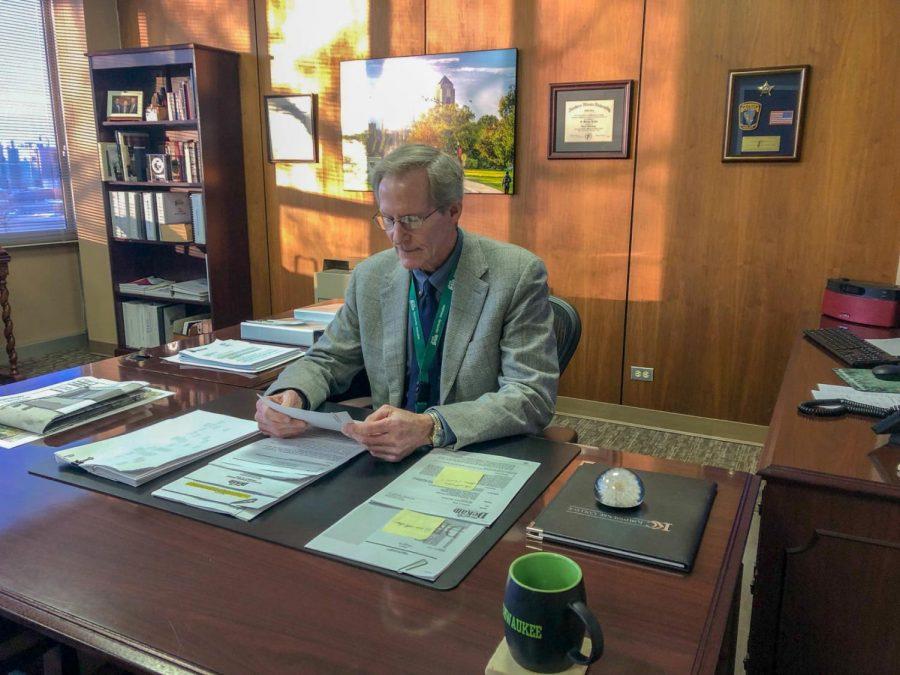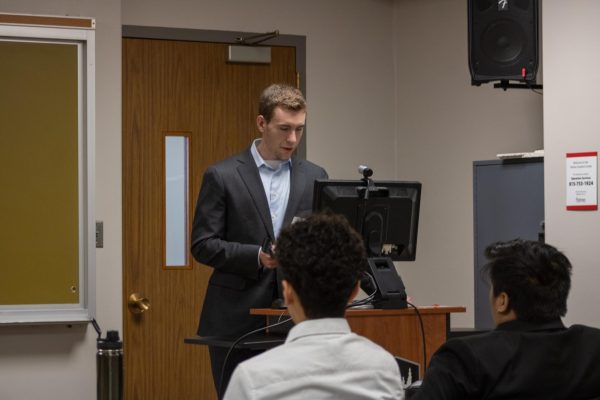City considers water system improvement spending
In this Jan. 14 photo, DeKalb City Manager Bill Nicklas sits at his desk and reviews documents after stepping into the position.
November 24, 2019
DeKALB — The city looks to spend $900,000 more in water system improvements for FY20, as it projects the same amount in water sales revenue as FY19, at $385,000, according to the proposed FY20 budget.
The City Council and Finance Advisory Committee met for the second time this week to consider the proposed budget. Wednesday’s special joint meeting continued where Monday’s had left off, with both bodies going over capital project and enterprise funds, among others.
The Water Fund is the largest of all enterprise funds, which accounts for operations financed and operated similarly to private business enterprises, according to the proposed budget.
The city estimates it could bring in $5,546,804 in new revenue for this fund. However, with debt service and loan payment costs, expenditures are shown to exceed that amount, at $6,336,226.
The net loss of $789,422 would bring the ending fund balance to $2,021,443, the proposed budget shows.
The city provides 1.1 billion gallons of water annually to residents and local businesses, but the number of gallons billed to residents has been on the decline since 2016, according to the proposal.
City Manager Bill Nicklas said the closing of businesses such as General Electric and Spaulding Composites, slow pace of housing construction and lowered enrollment at NIU have all contributed to this decline.
“What would make a difference would be a couple of large industrial users, as you know we’re pursuing that,” he said. “The several that we’re in conversation with would all be off-the-chart water users.”
The Water Capital Fund pertains to water-related fleet, equipment and infrastructure projects, according to the proposal. The city plans on putting aside $1.6 million dollars for water capital improvements, including $815,000 to paint the South Corporate Drive water tower.
The city also projects $1,836,200 in new revenue for this fund, bringing net revenue to $236,200, the proposal shows.
“The actual year-end projected fund balance for the water capital fund is 88% of the … proposed expenditure; that is extraordinary,” Nicklas said. “We are going to have enough money in there, not only to do everything we propose to do, but enough to do everything we propose to do next year as well.”
Capital Project Funds
The proposed FY20 budget adopts a 4-cent increase in the local motor fuel tax, with 75% percent of the increase going toward the Capital Projects Fund and the remaining 25% backing the Capital Equipment Replacement Fund.
The Capital Projects Fund accounts for most street maintenance, with the addition of public building improvements and alley repairs among other costs, according to the proposal.
Under the Capital Projects Fund, the city would appropriate $1,325,000 for road repairs — on Lincoln Highway, Sycamore Road, Dresser Road, etc. — while the projected total amount in new revenue is $1,652,583.
Assistant City Manager Raymond Munch said not all revenue going into the Capital Projects Fund comes from the motor fuel tax.
“The city has sold a number of parcels and different pieces of property around the city, and we have been putting those revenues into this fund,” he said. “So, in reality, some of these building maintenance projects that you see in the budget aren’t necessarily being funded by [the] motor fuel tax.”
The city is looking at purchasing a new fire engine, ambulance, three public works vehicles and four SUVs for a total of $1,145,000 with the Capital Equipment Replacement Fund. The Capital Equipment Replacement Fund accounts for city purchases of major equipment and vehicles, according to the proposal.
The ending fund balance for FY20 is projected to be $44,686, which is significantly less than FY19’s $649,603. The increase in expenditures on vehicles, from $55,000 to $1,145,000, is the primary cause for this.
“We’re spending down our balance here because we’re trying to aggressively make up for lost time,” Nicklas said. “We still have such an inventory of vehicles that are down or always on the verge of being down… [Seven] of our dump trucks are down. … We only have eight or nine.”
The council and committee also reviewed funds for workers’ compensation, health insurance, property and liability insurance, the library and police and firefighter pensions.














